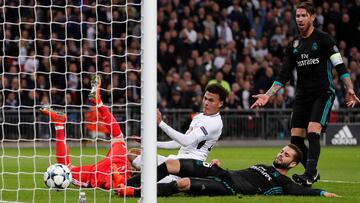English football's resurgence a threat to Spain's dominance
English sides have vastly improved in Europe: this year, the five English participants have only lost one game between them in the Champions League.

Five years ago, Didier Drogba scored the winning penalty that took the Champions League trophy back to the cabinets of Stamford Bridge. That happened in 2012, but was an anomaly at the time because the Premier League was in decline. From 2008 to 2012, eight of the semi-finalists in Europe's elite competition were from England's top flight. From 2013 to 2017 only two made it.
Yet today the widespread success of La Liga appears to be drawing to a close with the resurgent Premier League sides winning with style and authority. Of all the Champions League games played by English sides this season, Chelsea's defeat to Roma is the only defeat, and it will be a surprise if all five English representatives don’t qualify for the knockout stages.
The Premier League is the richest league in the world by some distance, receiving close to 10 billion euros over three years, more than double the second richest, La Liga. This is clear for all to see as English clubs can sign more players, often the most expensive, with the exception of PSG, Real Madrid and, to a lesser extent, Barcelona. Nowadays in England, more than before, those in charge of deciding who to buy or sell are, in footballing terms, experts in their own right.
Most English clubs have foreign owners (14 out of 20 clubs) who are doing away with the idea of the all-powerful manager and favouring a more European model, with directors of football, databases and scouts - not just the classic Englishman who normally goes for the classic long-ball type, strong and tall.
The allure for these owners comes through money and the promise of medium-term projects with the cream of European coaches: Guardiola, Pochettino, Klopp, Mourinho, Conte. There has been less stress on winning and more on building, which can only make clubs stronger. Therefore, clubs are better organised. As Gary Neville pointed out, "we were knocked out of the Champions League because our teams didn't know how to defend". The first four sides in the Premier League have shipped fewer goals at this point of the season than in the past five, and this has been replicated across Europe: only 0.7 goals have been conceded per game.
For this tactic to work better and for sides to compete with the best, everyone apart from Spurs has gone after foreign players, possibly because after decades of poor training, habits and mentalities needed to be changed in England. A case in point: In Tottenham's Champions League tie against Real Madrid, Pochettino started with six Englishman.
However, the Premier League is competitive in one aspect that La Liga is not. Referees are more lenient, with 'very English' rules, which means players can always rattle other players. This leniency and the noise from the stands urging teams to attack, coupled with highly physical encounters, hinders greater control over games. This demands much more of players at a time of year when they are stronger than players in La Liga. One caveat: problems will come in March and April when players in other leagues are fresher.
Related stories
The Premier League lion has awoken
The difference between the two leagues was English football's spectacular rise and the many years Spain spent maximising its potential. Another stat: this season, in the UEFA ranking by countries has England on top and Spain in third, while Italy have slipped into second. This certainly gives the impression that, for the time being, England sides have caught up and even overtaken us.
